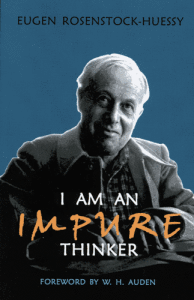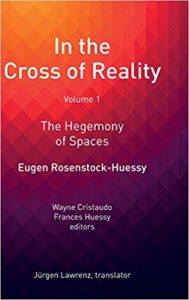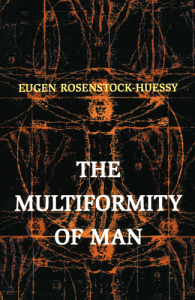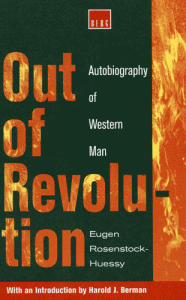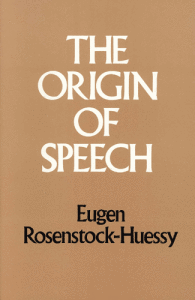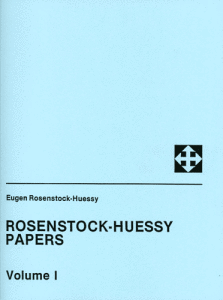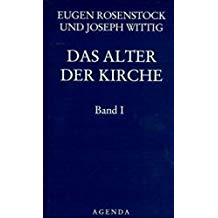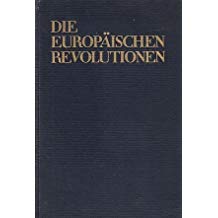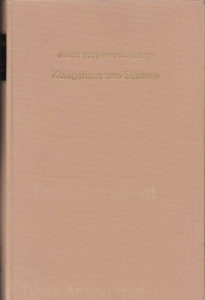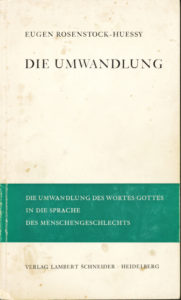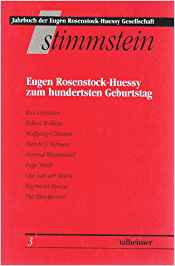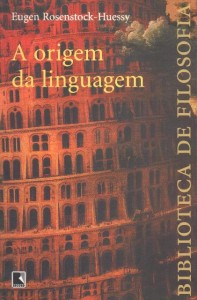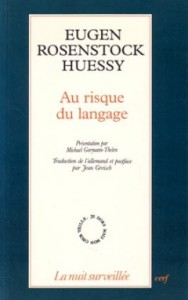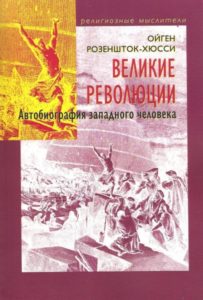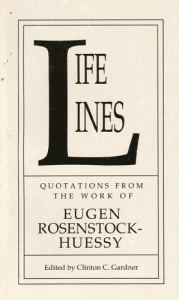Books by Rosenstock-Huessy
For four decades, the Fund operated a publishing wing, Argo Books, which published many of Rosenstock-Huessy’s English-language works and unpublished manuscripts as books. (The German Eugen Rosenstock-Huessy Gesellschaft undertook similar efforts with the German-language works; the Dutch group Respondeo published a number of translations into Dutch.) The Fund recently decided to pass on responsibility for Rosenstock-Huessy’s works to another publisher, and his English-language works are now available on Amazon, sold by Wipf and Stock of Eugene, OR, who also publish Jacques Ellul and William Stringfellow.)
We ask you to support Wipf and Stock by buying from them. Their prices are often competitive ( Out of Revolution is several dollars cheaper than anything on Amazon). To see a list of Rosenstock-Huessy’s works available from Wipf and Stock, click here.
You can also search for used copies of all Rosenstock-Huessy’s books on this page. We suggest Alibris for the best selection (and prices often competitive with Amazon), BookFinder for its astounding search function, and Better World Books because its prices include free shipping anywhere in the world.
The Christian Future or, The Modern Mind Outrun
by Eugen Rosenstock-Huessy. Harper Torchbooks, 1966.
In his 1946 preface, Rosenstock-Huessy writes:
"I had two classes of readers before me when I wrote: one the free fighters, men and women between twenty and thirty who struggle with the spirit in the form of the spirit of their own age and time. To them their generation is a secret society, and it has incommunicable tastes, enthusiasms and interests which are a mystery both to its predecessors and to posterity. The other class contains the men who have experienced the spirit as the great translator from age to age because they themselves have been drafted for this supreme service.
"The three men to whom this book is dedicated [Carl Muth, J.C. Oldham, and Ambrose Vernon] belong to this group. The dedication of this book is part of its ambitious aim. All these men have retranslated the forms of the spirit, for their own Church and day. They have strengthened my faith. In them I have been able to recognize the life-giving power of the Church's spirit.
"The book, however, which I am allowed to inscribe with their names, is a kind of apology for my different approach to the same eternal problem. For it tries to present the difficulties of a new era and of a new generation: of the generation who showed their faith by becoming soldiers of war. The crux of my life and of the life of the young has been the same: to break the impasse between the tradition of the Holy Ghost and the workings of the spirit of the times in the courage and faith of simple soldiers. The soldier in an army has faith in some spirit. How is this related to the faith in the Holy Spirit, of the Christian tradition?"
Harper Torchbook, 1966. Paperback, 248 pages.The Fruit of Our Lips The Transformation of God's Word into the Speech of Mankind
by Eugen Rosenstock-Huessy. Edited by Raymond Huessy. Wipf and Stock, 2021.
In the three essays included in this new edition of The Fruit of Our Lips, Eugen Rosenstock-Huessy made the clearest and most concise presentation of his understanding of the Christian tradition and of the creative power of the spoken word proclaimed at the beginning of Genesis, and hence at the heart of the Jewish and the Christian faiths. Two of the three essays have never appeared in English before. All three root in and contribute to the author’s ongoing dialogue with his friend Franz Rosenzweig and show the mutuality of the two men’s thinking, for all their differences.
Reading the material in the appendices in tandem with the three main essays, provides a unique overview of the interpenetration of Rosenstock-Huessy’s work on faith and his work on speech. In amending these essays (and in previously unpublished codas to the last of them) Rosenstock-Huessy still articulated and defended his faith in the terms he had used in his 1916 correspondence with Rosenzweig. Creation, revelation, and incarnation as on-going processes through the end of time; the rhythms of history; even Marcion’s role in forcing the church to formally proclaim Christ’s “Father” to be the LORD of Hebrew scriptures—all appear in the correspondence as they do in the title essay.
The first essay, "In the Cross of Reality," proclaims that the cross is to be found in every aspect of social reality, and that the truths made explicit in the life of Christ are to be found in all of human history. (Wayne Cristaudo has said that this brief excerpt from the second volume of Rosenstock-Huessy's Soziologie may be the key to his entire corpus.)
In the second, “Ichthys: Life, Teaching, and Action,” Rosenstock-Huessy formulates his “doctrine” of incarnation as an explicit response to the final section of Rosenzweig’s Star of Redemption. Rosenstock-Huessy shows how Christ’s life bore fruit in His teaching; but also how Christ lived backwards into life out of the vision granted in what Rosenzweig called “the sanctum that is in the innermost center”; and how that "life lived out of vision" was a life of action, a third phase quite separate from his teaching. Rosenstock-Huessy proclaims that sequence to be the inescapable conjugation of any fruitful spirit.
In 1945, Rosenstock-Huessy described the title essay as “the greatest chapter I have ever written." It is neither an analysis of nor a commentary on the Gospels, but seeks instead to lay "the foundation for a history of the human spirit." It argues that the fourfold character of the Gospels has profound meaning for the indivisible whole they form as Christ's "lips." Beginning with Matthew, each Evangelist takes as his audience one of the existing pre-Christian social orders (tribes, empires, the Greeks, and the Jews) and each Evangelist begins at the point to which his predecessor had come at the end. In the process of writing their Gospels, the four men themselves were changed--and it is that process which marks them as Evangelists.
As Freya von Moltke writes in her introduction to the title essay: "The gospels, says Rosenstock-Huessy, are the fruit of Jesus’ lips, the beginning of an entirely new way of speaking. Though they are four, they represent one organic whole. They complement each other; where one leaves off, the next one begins, and together they form a roadblock to the past. Together they started a process which has penetrated the ages—a process through which each writer himself is changed, as each addresses himself to one of the great streams of speech which antiquity had created. Used as we are to taking the New Testament as a religious book, it takes great effort for us to recognize the four gospels as the new process of speech, at once both human and universal."
ISBN: 9781725291546
I Am an Impure Thinker
by Eugen Rosenstock-Huessy. Argo, 2001.
I Am an Impure Thinker is a collection of essays that can be read as an introduction to Rosenstock-Huessy’s thought. He was an "impure thinker" because he believed that fruitful thought can only grow from passionate conviction and engagement rather than academic "objectivity," but also because he sees the truths of Christianity present throughout mankind's long history. Taken together, these apparently unrelated essays offer an answer to Dietrich Bonhoeffer’s question: How can we speak of God to modern man who has come of age?
Bonhoeffer’s close friend and biographer, Eberhardt Bethge, wrote that "Rosenstock-Huessy refuses to do anything in the usual way, but you may safely turn yourself over to him. Behind it all stands the responsibility of a great teacher committed to opening our eyes."
Argo Books, second edition, 2001. Paperback, 248 pages. (A PDF of this edition may be read here.)
In the Cross of Reality: The Hegemony of Spaces
Eugen Rosenstock-Huessy
Judaism Despite Christianity The 1916 Wartime Correspondence between Eugen Rosenstock-Huessy and Franz Rosenzweig
By Eugen Rosenstock-Huessy and Franz Rosenzweig
Translated by Dorothy M. Emmet. University of Chicago Press, 2011.
This book contains the correspondence between two German soldiers during World War I: Eugen Rosenstock, a logistics officer on the western front, and Franz Rosenzweig, serving in an antiaircraft outfit in Macedonia. The correspondence is both sequel to and fruit of a long conversation the two men had had with Rosenzweig's Christian cousin Rudolf Ehrenberg three years before, on the eve of Rosenstock's 25th birthday.
Wolfgang Ullmann wrote that "the 'night conversation in Leipzig' [was] an event in the history of religion. The man in full possession of all idealism's heritage, convinced by his seamless faith in philosophy to take up a tragic classical position toward religiosity, encounters not only a Jewish Christianity which signals the end of Christian assimilation into Renaissance humanism, but also a type of scholarly work which has advanced into new territory beyond the theologians’ and philosophers’ dominion over the university [which had prevailed] since the 12th century."
In July of 1913, Rosenstock's declaration of simple Christian faith had upended Rosenzweig's understanding of what religion was. In three months of struggle, he prepared himself to join in Rosenstock's acceptance of Christianity but, profoundly moved by the Yom Kippur services that fall, decided that while he would accept revelation on Rosenstock's terms, he would also remain a Jew, if not become a Jew for the first time. Ehrenberg was witness to his cousin's turmoil and knew of its result, but not until three years had passed did he tell Rosenstock and urge him to write his friend.
Often portrayed as an attempt by Rosenstock to convert his friend, the correspondence is in fact a no-holds-barred discussion that roots in Rosenstock's acceptance of Rosenzweig's decision to become a Jew. (Paul Mendes-Flohr has pointed out that both men were converts from the paganism prevalent in academe.) Although they could unite in the affirming that "revelation was orientation," they found that their opposing views only became more pronounced in the course of the correspondence; the exchange defined both men for the rest of their lives.
In his introductory essay, Alexander Altmann writes: "The ‘Letters on Judaism and Christianity’ of Franz Rosenzweig and Eugen Rosenstock-Huessy have rightly been described by H. J. Schoeps in Jüdisch-Christliches Religionsgespräch as one of the most important religious documents of our age."
This revised and expanded edition of Judaism Despite Christianity contains the complete text of the 1969 English-language first edition, together with a new introduction by Paul Mendes-Flohr, a new preface by Harold Stahmer, a chronology of Rosenstock-Huessy's work by Michael Gormann Thelen. University of Chicago Press, 2011. Paperback, 181 pages.Magna Carta Latina
by Eugen Rosenstock-Huessy with Ford Lewis Battles. Pickwick Press, 1975.
We owe this unusual Latin grammar to the fact that Rosenstock-Huessy's son Hans flunked Latin at the Putney School. His father felt that at least part of the problem lay in the lack of inspiring Latin texts, so he set out to draw the reader to Latin using the language of Thomas Aquinas, the Magna Carta, and Abélard, rather than that of Caesar. The book begins with a chapter on sung Latin; it rejoices in the heritage of the language, while acquainting the student with the major Latin documents of Europe's Christian heritage.
"Law and religion," Rosenstock-Huessy says, "medicine and science become clear to one who uses Latin. Two-thirds of our English vocabulary is Latin. The most precious documents of English constitutional history including the Magna Charta, the basic document of Anglo-Saxon liberties are in Latin. All Christian prayers were minted in the Latin language; secular rhyme and song came into the national languages from Latin sources."
Working from a draft created with his son's Latin teacher, Charles Moore, Rosenstock-Huessy produced this edition with his friend Ford Lewis Battles, translator of Calvin's Latin "Institutes of the Christian Religion" and a summertime neighbor in Norwich, VT.Paperback, 296 pages.
The Multiformity of Man
by Eugen Rosenstock-Huessy. Argo, 1973.
In his introduction, Rosenstock-Huessy writes: "The basis for the following chapters was formed by the lectures which, in 1935, I had the privilege to deliver at the Lowell Institute in Boston. Lectures and books try to formulate the new riddle laid before man by his own achievements. Man has succeeded in mechanizing his world. He has organized nature. For its very effectiveness, his deed raises the issue of man’s own position in nature with new acuteness."
Rejecting the 19th-century obsessive focus on the individual, Rosenstock-Huessy declares that in the industrial era, "man" exists at different times in a variety of states, all of which must be recognized and reconciled to describe "man."
He formulates "ecodynamic laws" to define each of the four states, and then expresses each state as a paradoxical mathematical equation: the team member who must act in solidarity with two other shifts in work around the clock is recognized in 3 x 1 = 1; the member of a community or a mass movement in ∞=1; the friend or lover in 1 + 1 = 1; the individual soul, in 1 = 1. If "man" is given a chance to be recognized in all four states, he is one, both complete and multiform.
Wipf and Stock, 2013. Paperback, 100 pages. (A PDF of the 2000 Argo edition may be read here.)
Out of Revolution Autobiography of Western Man
by Eugen Rosenstock-Huessy. Berg, 1993.
In his introduction, Harold Berman writes:
That this book written six decades ago is without any question an extraordinary book, a remarkable book, a fascinating book, has not saved it from relative obscurity. It is directed against conventional historiography, and for the most part the conventional historians have either ignored it or denounced it. ... I have no doubt that one day perhaps soon the academic historians will discover that Rosenstock-Huessy was also one of the great pioneers in a new and significant interpretation of the history of mankind.
Out of Revolution is history in the best sense of the word. Although it embodies original scholarship of the highest professional quality, it is written primarily for the amateur, the person of general education, who wants to know where we came from and whither we are headed. But it is also a theory of history: how history should be understood, how historians should write about it.
The historian Page Smith considered this Rosenstock-Huessy’s greatest work in English. In his 1964 book The Historian and History, he wrote:
Eugen Rosenstock-Huessy was one of those Europeans who at the end of World War I decided that the war had made familiar categories of thought obsolete. He undertook, in a series of books and articles, to illuminate the relation between history and the human experience and to explicate the progress of man through history toward a common future...
The revolutions of mankind, Huessy wrote, "create new time-spans for our life on earth. They give man’s soul a new relation between present, past, and future; and by doing so they give us time to start our life on earth all over again, with a new rhythm and a new faith." This is the framework for Huessy’s history of Europe and it may safely be said to be the first historical work written under the new dispensation. As such, it is of profound significance for contemporary history, but its very uniqueness has left it high and dry on the banks of academe. Nobody knew what to make of it because nobody had seen anything like it before.
Reinhold Niebuhr said of Out of Revolution:
Berg Publishers, 1993. Hardbound and paperback, 795 pages.Really a remarkable book, full of profound insights into the meaning of modern European history. I have not read a book in a long time which is so imaginative in relating the various economic, religious and political forces at play in modern history, to each other. Ordinary historical interpretations are pale and insipid in comparison with it.
The Origin of Speech
by Eugen Rosenstock-Huessy. Argo, 1981.
Rosenstock-Huessy argues that real speech, speech capable of transforming lives, must be and have always been formal speech, formal speech which can assemble, orient, and send forth strangers to pool their energies to create durable order and remarkable change. Intimate chitchat and everyday common sense, he says, can be nothing more than the residue of once revolutionary formal speech, the "uncommon sense" of political agreements and multi-generational projects.
The Origin of Speech declares that human beings require rituals and tangible signs that they live in an orderly universe over which they possess some control. In the process of exerting power through speech, people invariably create both the past and the future as the locations of society’s hopes and fears. Rosenstock-Huessy points out that the modern mentality has consistently preferred the informal to the formal, the abstract to the ritualistic, and numerical impartiality to personal address, and hence has forfeited the sources of a "grammatically healthy" community.
The Origin of Speech is Rosenstock-Huessy’s longest work on the subject of speech available in English; most of its component parts would also eventually appear in the second volume of Die Sprache des Menschengeschlechts.
Argo Books, 2013. Paperback, 160 pages.
Planetary Service A Way into the Third Millenium
by Eugen Rosenstock-Huessy, as Dienst auf dem Planeten.
In Planetary Service, Rosenstock-Huessy formulates his tripartite law of technological change: every such advance shortens time, widens space, and destroys a familiar social group. "The three gifts of technology: the acceleration of time, the widening of space, and the destruction of the existing peace must be offset, and they must be offset with the help of people who have nothing to do with technology."
Modern technology shrinks space and shortens time, and in its wake the question of how to change borders in a shrinking world arises. Borders cannot simply be dismissed; they protect their societies’ most important cultural heritage. And changing borders has hitherto nearly always required war; in a shrinking world, all war has become civil war. So what offers a way out, a "moral equivalent of war" in William James’ words? Rosenstock-Huessy believes that the answer to this pressing question is work service, that borders can be overcome by freely and openly addressing one another, and that shared labor creates the necessary shared space for conversation.
This book is important for everyone with an interest in voluntary work services, or hopes for its eventual universal requirement, but it has its flaws. When Rosenstock-Huessy was asked to write it in 1965 (in German, for Germans), he was already 77; the 1978 translation by Freya von Moltke and Mark Huessy of necessity leaves much of that specific material aside. Their work offers the American reader vivid evidence that work-service was at the heart of Rosenstock-Huessy’s life and work.
Argo Books, 2001. Paperback, 144 pages.
Practical Knowledge of the Soul
by Eugen Rosenstock-Huessy, as Angewandte Seelenkunde.
Translated by Mark Huessy and Freya von Moltke.
Edited by Clinton C. Gardner. Argo, 1988.
This book is a translation of Rosenstock-Huessy’s Angewandte Seelenkunde, his first attempt to formulate his new methodology for the social sciences based on the inherent structure of speech, which is the basic social reality.
Rosenstock-Huessy himself wrote: "When Thomas Paine exclaimed: 'These are the times that try men's souls,' he did not mean men's bodies or men's minds. And we know it." In this book devoted to knowledge of that mysterious entity, the "soul," which neither philosophers nor psychologists will have anything to do with, Rosenstock-Huessy gives that entity essential, practical meaning. Without recourse to anything mystical, transcendental, or poetic, he assures us of the reality of the individual soul for healthy human beings, and connects it to his larger work on an entirely new grammar that elevates to primacy the imperative and vocative forms of speech.
Angewandte Seelenkunde was published on its own in 1924, though it would later appear as the final chapter in the first volume of Rosenstock-Huessy's epic work on human speech, Die Sprache des Menschengeschlechts. The 1924 work was based on a manuscript Rosenstock-Huessy had written for his friend, Franz Rosenzweig, as part of their correspondence on Judaism and Christianity in 1916. (Rosenzweig later described it as "the main influence" for his masterwork, The Star of Redemption.)
This edition of Practical Knowledge of the Soul brings to light a document long hidden from those who read Rosenstock-Huessy's works in English. With a new introduction by Hans van der Heiden, Otto Kroesen, and Henk van Olst.
Wipf and Stock, 2015. Paperback, 116 pages.
Rosenstock-Huessy Papers, Volume I
by Eugen Rosenstock-Huessy. Argo, 1981.
Rosenstock-Huessy Papers, Volume I is a feast of ideas in nine essays. Although these essays make diverse and delightful digressions, the volume primarily addresses three topics: science, education, and religious discourse. Several of these essays have appeared in the two German books, Der Atem des Geistes (The Breath of the Spirit) and Die Sprache des Menschengeschlechts (The Speech of Mankind).
Rosenstock-Huessy describes the progress of scientific knowledge as a human social endeavor, rather than as a search for proper methods or as the product of lone genius. Human beings take up particular roles and positions relative to others in the process of inquiry hence, Michael Faraday was a "classic" and Paracelsus a "founder" in their own times. Given that the 1980s and 1990s have witnessed a national and international interdisciplinary movement to study the rhetoric of science, Rosenstock-Huessy’s essays, "A Classic and a Founder," "The Science of Bodies and the Appeal to Somebody," and "The Metabolism of Science," written many years ago deserve a wide reading today.
As his books and transcribed lectures attest, Rosenstock-Huessy often wrote and spoke of education. "Man Must Teach," his reflection on Augustine’s De Magistro, and "Time Bettering Days" are two of his profound contributions to educational thought, and both focus on time as their main theme. Rosenstock-Huessy argues persuasively in these essays that education is a meeting of people with different generational experiences. He also outlines why school must have a calendar that sets it apart from the workaday world.
In "Liturgical Thinking" and "The Generations of the Faith," Rosenstock-Huessy illustrates the complexity of both the Catholic and Protestant traditions. These essays, plus "Our Urban Goggles" and "The Future Way of Life" which are also published in this anthology make evident that most people today have settled for an impoverished version of Christianity that is a compromise with modernist dogmas. Rosenstock-Huessy urges each new generation to refound Christianity by bringing it to bear critically on the events of modern life.
Paperback (bound photocopies of original essays), 245 pages.
Speech and Reality
by Eugen Rosenstock-Huessy. Argo, 1970.
Introduction by Clinton C. Gardner
Speech and Reality contains seven essays that Rosenstock-Huessy wrote and revised between 1935 and 1955. In them he calls for a new age of social research in which the speaking subject displaces the mute object of orthodox sociology and proposes that the new method of inquiry for the social sciences be based on the truths of social grammar. Speech and Reality, which offers his diagnosis of the four possible dangers of unbalanced speech for society (anarchy, revolution, decadence, and war), can be read as an English-language introduction to Rosenstock-Huessy’s sociology
As John Macquarrie wrote in Commonweal:
"The author believes as did Dilthey before him that social sciences must suffer from being forced into the methodological mold of the natural sciences. Anyone acquainted with the kind of psychology and sociology commonly taught in the United States today could hardly fail to agree, and there is in fact currently a good deal of dissatisfaction with the naturalistic model used in these sciences. But where do we look for a better method?
"Rosenstock-Huessy suggests that we look to language. Speech is the basic social reality. Grammar, in turn, is the science which describes and analyzes the structures of language. Hence grammar is the foundation for developing a methodology for the social sciences. It must be added at once that it is not conventional grammar that the author has in mind. The grammar we learn in school and which enables us to reel off conjugations and the like is a grammar which has killed the drama and dignity of living speech. Rosenstock-Huessy has in mind a renewed grammar, a "higher grammar," as he sometimes calls it, which will attend to the nuances of tense and mood, and will see in these the structures of the social reality.... This book could make very helpful contributions toward working out a more human approach to the study of the human phenomenon."
Hardbound and paperback, 201 page.
Das Alter Der Kirche
by Eugen Rosenstock-Huessy and Joseph Wittig.
Reprint of 1927-28 edition, edited by Michael Gormann-Thelen and Fritz Herrenbruck, with a new afterword by Wolfgang Ullmann. Verlag Klaus Boer, 1996.
Hardbound (3 volumes), 1,320 pages.
The Age of the Church is the communal testament of two men facing the end of an era. The first two volumes contain essays that span the history of the church, but the book is more than a collection of essays. Rosenstock-Huessy’s colleague at the University of Breslau, the church historian Joseph Wittig, had been attacked as "Luther redivivus" for his statements of doctrine in essays written for what he saw as a Catholic people living in fear of its own Church; he was eventually excommunicated. (The ban was lifted unconditionally twenty years later.) The third volume is a detailed documentary record of the events leading up to Wittig’s excommunication.
In The Age of the Church, Rosenstock-Huessy writes that the true church knows no distinction between Catholic and Protestant; the Catholic holds order on the inside and endures chaos on the outside; the Protestant attempts to impose order on the world in order to allow his heart the fullness of freedom.
That description fits the authors themselves: Wittig "kept order on the inside," first by demonstrating how doctrine sprang from and was revealed by truths discernible in everyday experiences, and then by remaining steadfastly Catholic in the face of general condemnation; Rosenstock-Huessy’s works record the progress of the Spirit through time an ordering of time to permit free growth into the future. Rosenstock-Huessy’s first great vision at Verdun saw the millennium of European history as a whole. His work with Wittig widened that span to two millennia, and lays out the unity of the times from Golgotha to the present.
Der Atem Des Geistes
by Eugen Rosenstock-Huessy. Brendow Verlag, Amandus Verlag, 1991.
Der Atem des Geistes (The Breath of the Spirit, 1951) is the first book Rosenstock-Huessy published in Germany after World War II: a collection of essays presenting his method of inquiry for the social sciences, what he calls "a new science" in the first section of the book. In the chapter "Das Versiegen der Sprache" ("Speech Peters Out") he writes:
[Mankind has] been ignored for 40 years, because the sciences in office--all of them--take aim in their gnostic-platonic way at objects in nature and have no faith in names; in doing so, living man consciously distances himself from his own nature. However, a new ‘Organon’ for all the sciences of society, state and church [to replace Aristotle's canon] , a grammar of human associations is in the making here. (35)
Other chapters address Augustine and the Christian virtues; the faith of scientists like Faraday; the legacy of his friend, the theologian and church historian, Joseph Wittig; and the place of the Jesuits in the battle for the importance of social groups and against the hegemony of the mind in human life.Hardbound, 296 pages.
Des Christen Zukunft oder Wir überholen die Moderne
by Eugen Rosenstock-Huessy as The Christian Future, or The Modern Mind Outrun.
Translated and revised by Christoph von dem Bussche and Konrad Thomas. Siebenstern Taschenbuch Verlag, 1955. Reprinted in paperback by Brendow Verlag, 1985.
288 pages.
This edition has a preface by J. H. Oldham. For a description, see The Christian Future.
Die Europäischen Revolutionen
by Eugen Rosenstock-Huessy. Brendow Verlag, 1987.
While serving as an officer before Verdun in 1917, Rosenstock-Huessy had a great vision of the unity over time of the separate histories of Europe's peoples: that every European nation had developed its distinguishing characteristics in a great revolutionary upheaval like the World War, and that the upheavals which molded the spiritual and cultural outlook of the separate nations were part of a single, vast process. He saw the unity of a millennium of connected revolutions running from 1076, when the Pope declared the church's independence from the Holy Roman Emperor (beginning the tradition of separating church and state) to the "marriage of war and revolution" he saw before his eyes in 1917. He saw the Russian Revolution as an overture to the two World Wars which, taken together as a single historical event, did what Communism could not do--create a global society in which the peoples of the world became dependent on one another. For a further description of the ideas, see Out of Revolution.
Die Europäischen Revolutionen is the book on which Out of Revolution was based, but the English-language edition is not a translation. With the help of American friends, Rosenstock-Huessy re-wrote the book for Americans, reversing the order of its chapters to make recent history the point of entry to the sequence of revolutions that forged Europe. This German original is chronologically organized and has quite a different text.
Paperback, 584 pages.
Heilkraft Und Wahrheit Konkordanz der Politischen und Kosmischen Zeit
by Eugen Rosenstock-Huessy. Brendow Verlag, Amandus Verlag, 1991.
This reprint of a book published in 1952 presents the grammatical method as a tool to study times and eras. When the grammatical method is used, history appears as the economy of salvation. As a background, the book explores the paradigms that underlie theology and the natural sciences.
The first chapters criticize theology, saying it should narrate not theorize, should function as a servant, not as a ruler. The middle of the book, chapter 5, "The Execution of God," addresses modern times. Chapters 6-11 use Paracelsus as an example to present Rosenstock-Huessy’s view of developments over time as the key events in the social sciences.
Paperback, 219 pages.
Herzogsgewalt und Friedensschutz Deutsche Provinzialversammlungen des 9-12 Jahrhunderts
by Eugen Rosenstock-Huessy. Scientia Verlag Aalen 1969.
A facsimile reprint of the 1910 first edition, Herzogsgewalt und Friedensschutz (Princely Power and Peacekeeping) is an expanded version of Rosenstock-Huessy’s dissertation (Landesfriedensgerichte und Provinzialversammlungen vom neunten bis zwölften Jahrhundert (Local Courts and Regional Parliaments from the Ninth to the Twelfth Century), Heidelberg, 1909). Much of the matrix of modern European civilization was forged during the years covered in the title; Rosenstock-Huessy elucidates the development of both peace-keeping and legal process in the western regions of the Holy Roman Empire, exploring the traces of that formative process in the surviving written sources and evaluating the historical impact of those documents at the time of their composition.
Hardbound, 205 pages.
Königshaus und Stämme
by Eugen Rosenstock-Huessy. Scientia Verlag, 1965.
Königshaus und Stämme outlines the development of royal houses and the household system of the royal families, the aristocracy, as a form of constitutional law. This constitutional system went beyond the bounds of the tribes involved, which were often at loggerheads with one another. Building on the principles outlined in Königshaus und Stämme, Rosenstock-Huessy later developed the theory that the power of royal houses to found constitutional systems was the deep secret of empires, from ancient Egypt over Charlemagne to the League of Nations.
Hardbound, 402 pages.
Soziologie Im Kreuz der Wirklichkeit. Eine nach-Goethesche Soziologie
by Eugen Rosenstock-Huessy. In 3 volumes, hardbound, about 1050 pages. Talheimer Verlag, Mossingen-Talheim, Germany. Planned release 1997.
Soziologie is one of Rosenstock-Huessy’s fundamental works, written around the spaces and times which govern human life, language and associations. To Rosenstock-Huessy, speech is central to sociology; sociology must recognize that speech is the concrete form of social reality.
In Volume 1, Rosenstock-Huessy presents the areas of existence in which people play or confront serious life, such as marriage or service in war. He says that important human experiences like these are created by human powers like enthusiasm, love, or faith. He then contrasts these life-changing, deeply rooted experiences in time and space with the abstract concepts, space and time. He sees these human powers as the concrete forces which create timespans, and so create and structure history. In Volume 2 he turns to history, which he sees as one part of each person’s soul, and so a major influence on people’s actions. He presents recurring historical events and times both as people’s personal experiences and as constituent parts of a larger whole. In Volume 3 he turns to questions of people living together, and discusses the way they create communities and social structures.
These volumes, entitled The Hegemony of Spaces (Die Übermacht der Räume) and The Full Count of Times (Die Vollzahl der Zeiten, 1 and 2), have made a lasting impression on readers. The first volume recently appeared in English, as The Cross of Reality: The Hegemony of Spaces, and the second volume is in preparation. Some of the material may also be found in the lecture series Cross of Reality (1953), in the Circulation of Thought group, and in the Universal History group.
Die Sprache Des Menschengeschlechts
by Eugen Rosenstock-Huessy. Verlag Lambert Schneider, 1963 and 1964
"Language is wiser than he who speaks it," Rosenstock-Huessy often to used to say to underline the scope of language. Language contains the experiences and inspirations of the ages. The language that people speak and the great historical learning experiences in their cultures have developed in the same process. Language is at the core of Rosenstock-Huessy’s view of social reality.
In this large collection of individual essays from 1916-1964 the author presents his fundamental view on language. The first volume closes with the German original version of Practical Knowledge of the Soul; the second volume closes with a German version of Fruit of Lips. Many of the essays contained in The Origin of Speech were written in English, and then translated into German and thoroughly revised so that they could be included in Die Sprache des Menschengeschlechts.
Two volumes, hardcover. Vol. 1, 810 pages; Vol. 2, 904 pages.
Die Tochter/Das Buch Ruth Series: "Texte aus der Geschichte."
edited by Bas Leenman. Talheimer Verlag, Mossingen-Talheim, Germany 1988.
In the aphasia that reigned in Europe after the end of World War I, Rosenstock-Huessy was searching for ways to renew speech. After having fought at the front near Verdun for several years and having witnessed the devastation of Europe, he believed that male speech was no longer fruitful and had come to its end. In his moving essay, Die Tochter (The Daughter), Rosenstock-Huessy introduces daughterly speech as the cure for mankind at this point in time. At the instigation of the author, Bas Leenman brought this essay together with Martin Buber’s translation into German of the Book of Ruth. The publication was made possible by the Stichting Eugen Rosenstock-Huessy Fonds in The Netherlands.
Hardbound, 46 pages.
Die Umwandlung Die Umwandlung des Wortes Gottes in die Sprache des Menschengeschlechts
by Eugen Rosenstock-Huessy. Verlag Lambert Schneider, 1968.
Rosenstock-Huessy approved the publication of his essay "The Fruit of Our Lips" twice in his lifetime: first, as the capstone of his two-volume retrospective of his works on language, Die Sprache des Menschengeschlechts, and in this troika of essays. The first two essays have never appeared in English, though the first, "Im Kreuz der Wirklichkeit" ("In the Cross of Reality"), is the last chapter of the two-volume Soziologie (1958). The second, "ICHTHYS: Leben, Lehre, Wirken," (ICHTHYS: Life, Teaching, and Action") was originally written as a polemic against the stand Franz Rosenzweig took at the end of The Star of Redemption; the version published four years later as part of Das Alter der Kirche (The Age of the Church) is neither polemic nor addressed to Rosenzweig. In the essay he not only makes the clearest statement of his understanding of Christ, but argues that the true nature of incarnation is the result of a modern (and entirely new) imitatio Christi, one that is primarily political in nature.
Paperback, 138 pages.
Werkstattaussiedlung An Investigation into the Lives of Industrial Workers
by Eugen Rosenstock-Huessy, Eugen May, and Martin Grünberg. Brendow Verlag, Moers, Germany, 1997. Hardbound, 286 pages.
Rosenstock-Huessy confronted the fact that in destroying master craftsmen’s independent workshops, the Industrial Revolution had deprived them of both work autonomy and a valuable asset to bequeath. He declared the necessity of a kind of "industrial feudalism" to redress this loss.
In Werkstattaussiedlung, originally published in 1922, he proposes setting up experienced workers in their own shops, obligated to meet production quotas for the parent company, but otherwise free to take on outside work and to organize production as they see fit. Over time, ownership of the satellite shops would pass to the former employees, who would then be free to bequeath the shop as they saw fit, the contractual obligation to the parent company remaining in force. The book starts with the life story of the lathe operator Eugen May and closes with a proposal for enabling legislation under the Weimar constitution.
Zurück in Das Wagnis Der Sprache
by Eugen Rosenstock-Huessy. Verlag Die blaue Eule, Essen, 1997. Hardbound, 80 pages.
This is a fictitious letter, supposedly written by the Greek philosopher Heraclitus to the Greek philosopher Parmenides. Parmenides teaches concepts and abstractions; Heraclitus represents active life, where names and serious speech reign. Assuming the role of Heraclitus, Rosenstock-Huessy attacks the German philosopher Martin Heidegger as a modern Parmenides.
Stimmstein
De Vrucht Der Lippen waarom vier Evangeliën
by Eugen Rosenstock-Huessy. Translated from the German by Elias Voet and Sam Hartman. Ten Have, Baarn, The Netherlands, 1981. Paperback, 126 pages.
This little book is the translation into Dutch of the essay Rosenstock-Huessy chose to make the capstone of his two-volume Die Sprache des Menschengeschlechts. In it he passionately defends the authority of all four gospels, and their life as Christ's "lips." He cites de Bruyne and Harnack for his argument, and finds internal evidence that the evangelists were not only aware of each other's work, but that each began where the last had left off, that each gospel evoked the next.
Rosenstock-Huessy wrote two different versions of this essay; both the 1954 English original and a translation of the 1964 German version are available in The Fruit of Our Lips.
Dienen Op De Planeet korte en lange adem in het derde millennium
by Eugen Rosenstock-Huessy, as Dienst auf dem Planeten. Translated from the German by Dé Mulder and Elias Voet. Vereniging Rosenstock-Huessy Huis, Haarlem, The Netherlands, 1988. Paperback, 130 pages.
This edition has a preface by Bas de Gaay Fortman. (For a description, see Planetary Service.)
Iedereen Moet Onderwijzen, Augustinus, De Eerste Metanoom
by Eugen Rosenstock-Huessy, as "Jeder Muβ Lehren," a part of Die Sprache des Menschengeschlechts. Translated from the German by Sam Hartman and Hermien Vriezen-Rozemond. Vereniging Rosenstock-Huessy Huis, Haarlem, The Netherlands, 1986. Paperback, 36 pages.
In this essay Rosenstock-Huessy reflects on St. Augustine’s De Magistro. He praises teaching for granting us the power to compare living human time with abstract thinking, and names hope, faith, and love as the great powers of the human soul. More than mere virtues or dogmas, they are the forces which create time spans, and so underlie all history.
Spraak En Werkelijkheid
by Eugen Rosenstock-Huessy, as Speech and Reality. Translated from the English by Elias Voet. Vereniging Rosenstock-Huessy Huis, Haarlem, The Netherlands, 1978. Paperback, 155 pages.
This edition has an introduction by Clinton C. Gardner. (For a description, see Speech and Reality
Toekomst, Het Christelijk Levensgeheim
by Eugen Rosenstock-Huessy as The Christian Future, or the Modern Mind Outrun and as Des Christen Zukunft, oder Wir überholen die Moderne. Translated by Ko Vos.
DABAR/boekmakerij Luyten, Aalsmeer, The Netherlands, 1993. Hardbound, 286 pages.
This edition was translated into Dutch from both the original English and the revised German edition. The preface is by J.H. Oldham. (For a description, see The Christian Future.)
Toegepaste Zielkunde
by Eugen Rosenstock-Huessy as Angewandte Seelenkunde. Translated from the German by Sam Hartman. Vereniging Rosenstock-Huessy Huis, Haarlem, The Netherlands, 1982. Paperback, 47 pages.
(For a description, see Practical Knowledge of the Soul.)
A origem da linguagem
Brazil's Editora Record published Olavo de Carvalho's translation of The Origin of Speech in Portugese as A origem da linguagem as part of their Biblioteca de Filosofia series. It is available through Brazilian internet bookstores.
Au risque du langage
Les Editions du Cerf, Paris, published a French translation of Zurück in das Wagnis der Sprache, Au risque du langage, in 1997. It is in paperback and 160 pages long. In addition to the title piece, it contains "Datives Denken" from Heilkraft und Wahrheit and "Jacob Grimms Sprachlosigheit" from Das Geheimnis der Universität. Les Editions du Cerf is on the internet here.
Other Russian Translations
In Russia, Labyrinth Publishers released in 1994 the Russian translation of Speech and Reality. Canon Publishers in Moscow published in 1998 a collection of essays to be called God Makes Us Speak, edited by Prof. Alexander Pigalev of Volograd, which will include seven chapters from various publications of Rosenstock-Huessy. The Soros Foundation in Russia funded the publication of a book consisting of selections from Rosenstock Huessy's works, E. Rosenstock Huessy. The Speech of Humankind: Selected Writings, edited by Alexander Pigalev. The book appeared in the Soros series "Faces of Culture." "Faces of Culture" is a publishing project whose goal is to introduce the philosophical heritage of western thinking to Russia. "Faces of Culture" has also included the works of Paul Tillich, Karl Mannheim, and Wilhelm Windelband.
Bеликие Революции (Great Revolutions)
The Fund sponsored the translation of Out of Revolution into Russian. The book was translated by Vitaly Makhlin, Oleg Osovsky, Alexander Pigalev, Igor Solomadin, Alexei Vasilyev and Igor Yefimov. The first edition of this translation was published by Hermitage Press in 1999 under the title Великие Революции (Great Revolutions). A Russian edition of this translation was published in 2002 by St. Andrew's Biblical Theological College, Moscow, Russia.
People interested in contacting Hermitage Publishers should write, call, fax or email: Hermitage Publishers, P.O. Box 410, Tenafly, NJ 07670, USA (201) 894 8247, Fax: (201) 894 5591, email: yefimovim <at> aol <dot> com
People interested in contacting St. Andrew's Biblical Theological College should write, call, fax or email: St Andrew`s Biblical Theological College, Jerusalem St. 3, Moscow, 109316, Russia Tel/fax: +7 (095) 2702200, +7 (095) 2707644, email: standrews <at> standrews <dot> ruAndragogik "Andragogik" (first published in the first number of the Archiv für Erwachsenenbildung, the house journal of the Hohenrodter Bund (1924): 248-276.)
Eugen Rosenstock-Huessy
Life Lines Quotations from the Work of Eugen Rosenstock-Huessy
Edited by Clinton C. Gardner. Argo, 1988.
Paperback, 83 pages.
Out of Revolution
Die Zahlensprache der Physik
Ein Komma
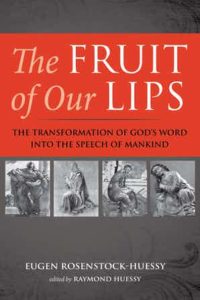
The Fruit of Our Lips
by Eugen Rosenstock-Huessy. Edited by Raymond Huessy. Wipf and Stock, 2021.
Buy this book from:
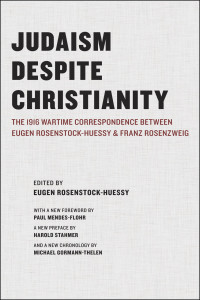
Judaism Despite Christianity
By Eugen Rosenstock-Huessy and Franz Rosenzweig
Translated by Dorothy M. Emmet. University of Chicago Press, 2011.
Buy this book from:
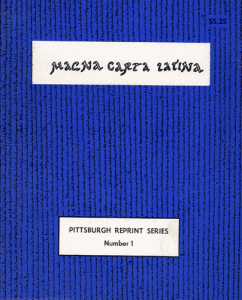
Magna Carta Latina
by Eugen Rosenstock-Huessy with Ford Lewis Battles. Pickwick Press, 1975.
Buy this book from:
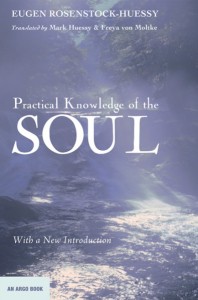
Practical Knowledge of the Soul
by Eugen Rosenstock-Huessy, as Angewandte Seelenkunde.
Translated by Mark Huessy and Freya von Moltke.
Edited by Clinton C. Gardner. Argo, 1988.
Buy this book from:
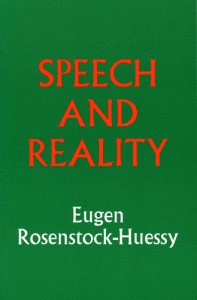
Speech and Reality
by Eugen Rosenstock-Huessy. Argo, 1970.
Introduction by Clinton C. Gardner
Buy this book from:

Der Atem Des Geistes
by Eugen Rosenstock-Huessy. Brendow Verlag, Amandus Verlag, 1991.
Buy this book from:
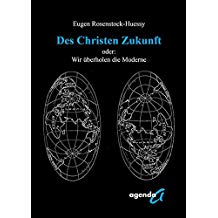
Des Christen Zukunft
by Eugen Rosenstock-Huessy as The Christian Future, or The Modern Mind Outrun.
Buy this book from:

Heilkraft Und Wahrheit
by Eugen Rosenstock-Huessy. Brendow Verlag, Amandus Verlag, 1991.
Buy this book from:

Herzogsgewalt und Friedensschutz
by Eugen Rosenstock-Huessy. Scientia Verlag Aalen 1969.
Buy this book from:
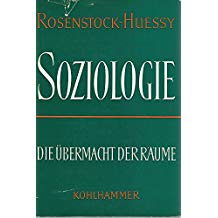
Soziologie
by Eugen Rosenstock-Huessy. In 3 volumes, hardbound, about 1050 pages. Talheimer Verlag, Mossingen-Talheim, Germany. Planned release 1997.
Buy this book from:

Die Sprache Des Menschengeschlechts
by Eugen Rosenstock-Huessy. Verlag Lambert Schneider, 1963 and 1964
Buy this book from:
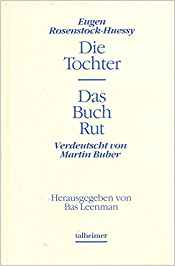
Die Tochter/Das Buch Ruth
edited by Bas Leenman. Talheimer Verlag, Mossingen-Talheim, Germany 1988.
Buy this book from:

Werkstattaussiedlung
by Eugen Rosenstock-Huessy, Eugen May, and Martin Grünberg. Brendow Verlag, Moers, Germany, 1997. Hardbound, 286 pages.
Buy this book from:
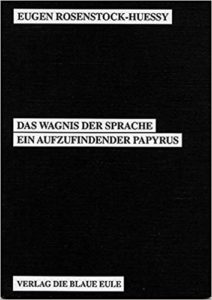
Zurück in Das Wagnis Der Sprache
by Eugen Rosenstock-Huessy. Verlag Die blaue Eule, Essen, 1997. Hardbound, 80 pages.
Buy this book from:
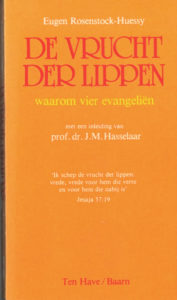
De Vrucht Der Lippen
by Eugen Rosenstock-Huessy. Translated from the German by Elias Voet and Sam Hartman. Ten Have, Baarn, The Netherlands, 1981. Paperback, 126 pages.
Buy this book from:
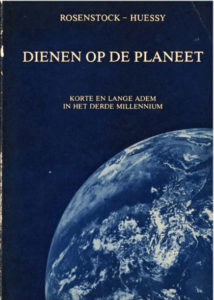
Dienen Op De Planeet
by Eugen Rosenstock-Huessy, as Dienst auf dem Planeten. Translated from the German by Dé Mulder and Elias Voet. Vereniging Rosenstock-Huessy Huis, Haarlem, The Netherlands, 1988. Paperback, 130 pages.
Buy this book from:
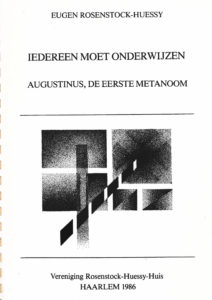
Iedereen Moet Onderwijzen, Augustinus, De Eerste Metanoom
by Eugen Rosenstock-Huessy, as "Jeder Muβ Lehren," a part of Die Sprache des Menschengeschlechts. Translated from the German by Sam Hartman and Hermien Vriezen-Rozemond. Vereniging Rosenstock-Huessy Huis, Haarlem, The Netherlands, 1986. Paperback, 36 pages.
Buy this book from:
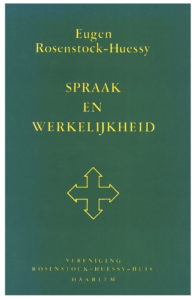
Spraak En Werkelijkheid
by Eugen Rosenstock-Huessy, as Speech and Reality. Translated from the English by Elias Voet. Vereniging Rosenstock-Huessy Huis, Haarlem, The Netherlands, 1978. Paperback, 155 pages.
Buy this book from:

Toekomst, Het Christelijk Levensgeheim
by Eugen Rosenstock-Huessy as The Christian Future, or the Modern Mind Outrun and as Des Christen Zukunft, oder Wir überholen die Moderne. Translated by Ko Vos.
Buy this book from:



